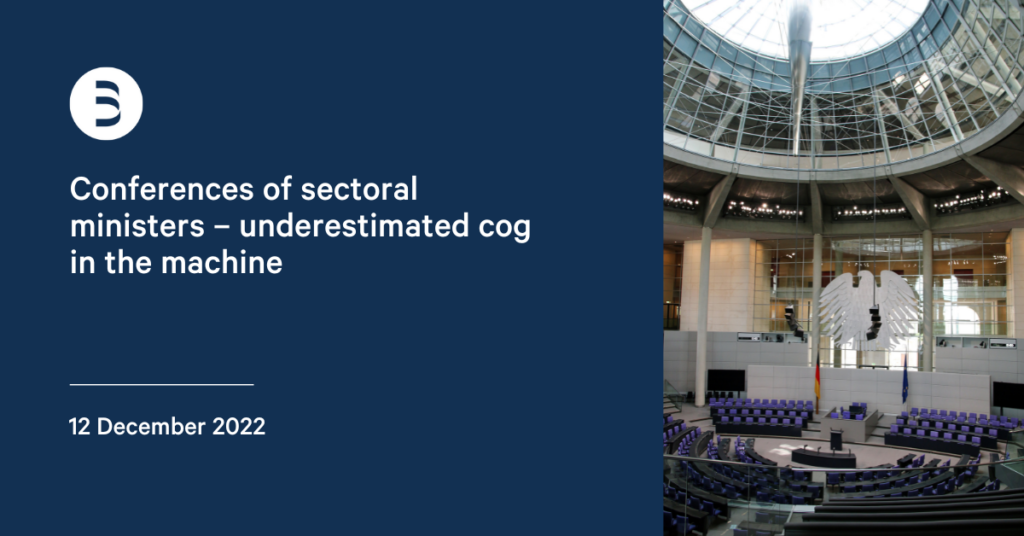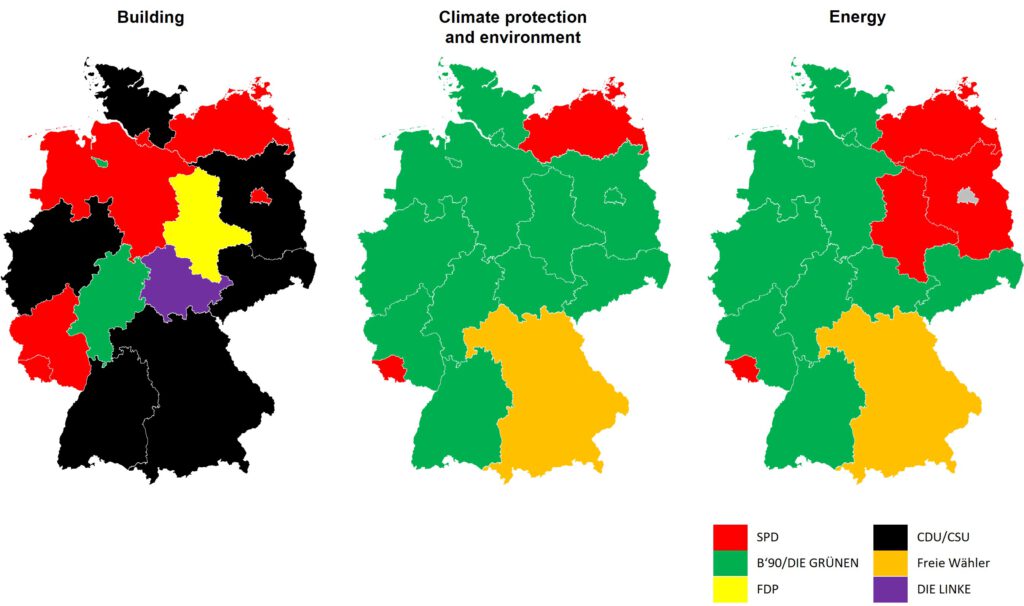
During the Corona pandemic, the Conference of Minister Presidents (Ministerpräsidentenkonferenz – MPK) moved sharply into the public spotlight. Before that, it tended to lead a shadowy existence in the eyes of the general public. The same is still true – and perhaps even more so – for the conferences of sectoral ministers (Fachministerkonferenzen – FMK) among the federal states. It is worth taking a look at these conferences and the associated cooperation between the federal states. It is not without reason that Dr. Claus-Peter Clostermeyer, the long-serving head of the Baden-Württemberg representation in Berlin, attributes to the conferences of ministers a “role for legislation and administration in the Federal Republic that can hardly be overestimated.
In principle, horizontal and vertical cooperation plays an important role in the federal state. This also includes the conferences of sectoral ministers. They are the horizontal, voluntary cooperation of the Länder, serve sectoral coordination and pass joint resolutions. In addition to the respective ministers of the Länder, the federal level is also involved in the conferences. The respective federal ministry is represented as a permanent guest at many of the conferences of sectoral ministers. In addition, the specialist policy spokespersons of the governing majority in the federal government are also involved in the preliminary discussions of the A states (SPD-led) and B states (CDU-led). These circumstances result in an advantage for both sides: both levels remain informed about the political plans of the other level. Sometimes the conferences of ministers can also be decisive forums in policy areas in which legislative competence lies purely formally with the federal government. In the case of topics such as the digitalization of the administration, it would be unwise not to reach agreement with the states in advance. This then takes place in the conferences of sectoral ministers and gives the states a good opportunity to exert influence on the relevant project.
At the same time, conferences of sectoral ministers also serve to intensify coordination among the states with regard to decisions and voting behavior in the Bundesrat. This coordination is also simply necessary due to the mass of decisions to be made by the Bundesrat. In this way, technical points and majority capabilities can be sounded out at an early stage of a legislative project. Federal states can share specific concerns with other federal states and canvass support for the respective project. It also allows the states to pool their individual expertise. For example, Hesse has expertise in banking and aviation issues, while the coastal states are the experts in maritime issues.
With the knowledge of the previously described importance and impact of the conferences of sectoral ministers, it becomes clear that their political composition also plays a major role. It is particularly interesting when the party-political composition of the conference of sectoral ministers does not correspond to the party-political majority in federal politics – i.e. when an opposition party in the federal government has a predominance in a conference of sectoral ministers.
An example of this is the Conference of Building Ministers (BMK), the conference of state ministers responsible for housing and building. The figure below shows that the state ministries responsible for construction are more often occupied by the Conservatives (CDU) than other relevant ministries. The CDU has already taken advantage of this.

Presentation of the party affiliation of the state ministries responsible for building, climate protection, environment and energy
Important impulses repeatedly emanate from the BMK in the direction of the federal level, and conflict is also readily sought. It is worth looking at the topic of building energy: Here, the states play a very important role, although the area is predominantly regulated by federal law. This is all the more true in the current situation, where the newly established Federal Ministry of Housing, Urban Development and Building (BMWSB) is still in the process of being established and has fallen behind in important discussions with the states. The BMK has taken advantage of this situation, for example by taking a clear position on abandoning the energy efficiency principle and by setting up a working group to develop a concept for the regulatory integration of life-cycle emissions. This approach underscores the ability of the countries to coordinate their positions on important issues. The BMK has also made it clear to the federal government that it does not view decarbonization of the building stock as an overriding goal, but one that has equal priority with the creation of affordable housing.
Looking at the conferences of sectoral ministers from this angle shows that the actual line of conflict in the federal system does not always have to lie between the federal government and the states. In the case of building energy, it lies between the federal government and the CDU-led state ministries. This finding illustrates the importance and influence of the conferences of sectoral ministers in German federalism – and thus their role, which can hardly be overestimated.